

Canadian Legal Information Institute. Deanclifford.info. Constitution Acts, 1867 to 1982. Constitution Acts, 1867 to 1982. Canadian Bill of Rights. Assented to 1960-08-10.
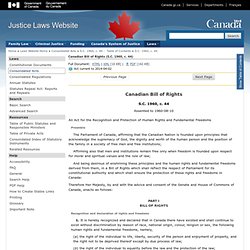
International Covenant on Civil and Political Rights. The Universal Declaration of Human Rights. Whereas recognition of the inherent dignity and of the equal and inalienable rights of all members of the human family is the foundation of freedom, justice and peace in the world, Whereas disregard and contempt for human rights have resulted in barbarous acts which have outraged the conscience of mankind, and the advent of a world in which human beings shall enjoy freedom of speech and belief and freedom from fear and want has been proclaimed as the highest aspiration of the common people, Whereas it is essential, if man is not to be compelled to have recourse, as a last resort, to rebellion against tyranny and oppression, that human rights should be protected by the rule of law, Whereas it is essential to promote the development of friendly relations between nations, Whereas Member States have pledged themselves to achieve, in co-operation with the United Nations, the promotion of universal respect for and observance of human rights and fundamental freedoms, Article 1.
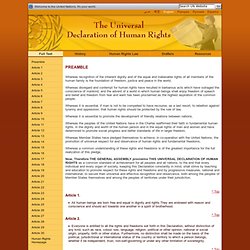
Article 2. Article 3. WikiProject Law. Trust law. The trustee may be either an individual, a company, or a public body.
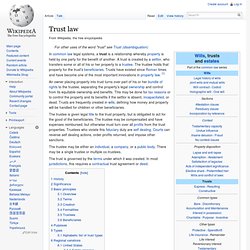
There may be a single trustee or multiple co-trustees. The trust is governed by the terms under which it was created. In most jurisdictions, this requires a contractual trust agreement or deed. History[edit] The Lord Chancellor would consider it "unconscionable" that the legal owner could go back on his word and deny the claims of the Crusader (the "true" owner). Significance[edit] Although trusts are often associated with intrafamily wealth transfers, they have become very important in American capital markets, particularly through pension funds (essentially always trusts) and mutual funds (often trusts).[2] Basic principles[edit] Overview[edit] In a relevant sense, a trust can be viewed as a generic form of a corporation where the settlors (investors) are also the beneficiaries.
Terms[edit] Chart of a trust Appointer: This is the person who can appoint a new trustee or remove an existing one. Creation[edit] Contract. Proof of some or all of these elements may be done in writing, though contracts may be made entirely orally or by conduct.
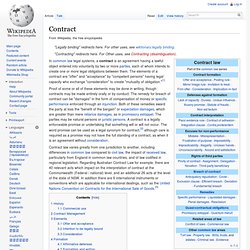
The remedy for breach of contract can be "damages" in the form of compensation of money or specific performance enforced through an injunction. Both of these remedies award the party at loss the "benefit of the bargain" or expectation damages, which are greater than mere reliance damages, as in promissory estoppel. The parties may be natural persons or juristic persons. A contract is a legally enforceable promise or undertaking that something will or will not occur. The word promise can be used as a legal synonym for contract,[2] although care is required as a promise may not have the full standing of a contract, as when it is an agreement without consideration. History[edit] Law of Canada.
Canadian contract law. Elements of a contract[edit] In following with the common law tradition, a contract requires offer, acceptance, and consideration.
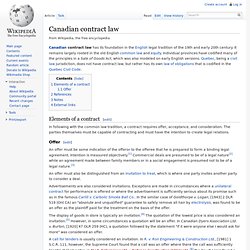
The parties themselves must be capable of contracting and must have the intention to create legal relations. Offer[edit] An offer must be some indication of the offeror to the offeree that he is prepared to form a binding legal agreement. Intention is measured objectively.[1] Commercial deals are presumed to be of a legal nature[2] while an agreement made between family members or in a social engagement is presumed not to be of a legal nature.[3] An offer must also be distinguished from an invitation to treat, which is where one party invites another party to consider a deal. Advertisements are also considered invitations. Canadian administrative law. Canadian administrative law is the body of law that addresses the actions and operations of governments and governmental agencies.[1] That is, the law concerns the manner in which courts can review the decisions of administrative decision-makers (ADMs) such as a board, tribunal, commission, agency or minister.
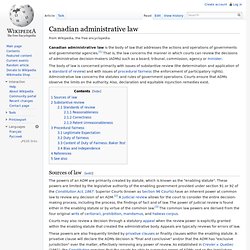
The body of law is concerned primarily with issues of substantive review (the determination and application of a standard of review) and with issues of procedural fairness (the enforcement of participatory rights). Administrative law concerns the statutes and rules of government operations. Courts ensure that ADMs observe the limits on the authority. Also, declaration and equitable injunction remedies exist. Administrative law. Administrative law in the United States often involves the regulatory activities of so-called "independent agencies", such as the Federal Trade Commission ("FTC"), whose Washington D.C. headquarters are shown above.
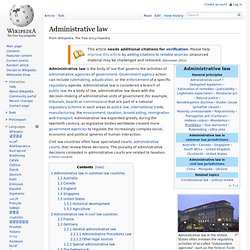
Civil law countries often have specialized courts, administrative courts, that review these decisions. The plurality of administrative decisions contested in administrative courts are related to taxation. [citation needed] Admiralty law. Admiralty law (also referred to as maritime law) is a distinct body of law which governs maritime questions and offenses. It is a body of both domestic law governing maritime activities, and private international law governing the relationships between private entities which operate vessels on the oceans. It deals with matters including marine commerce, marine navigation, marine salvaging, shipping, sailors, and the transportation of passengers and goods by sea.
Admiralty law also covers many commercial activities, although land based or occurring wholly on land, that are maritime in character.